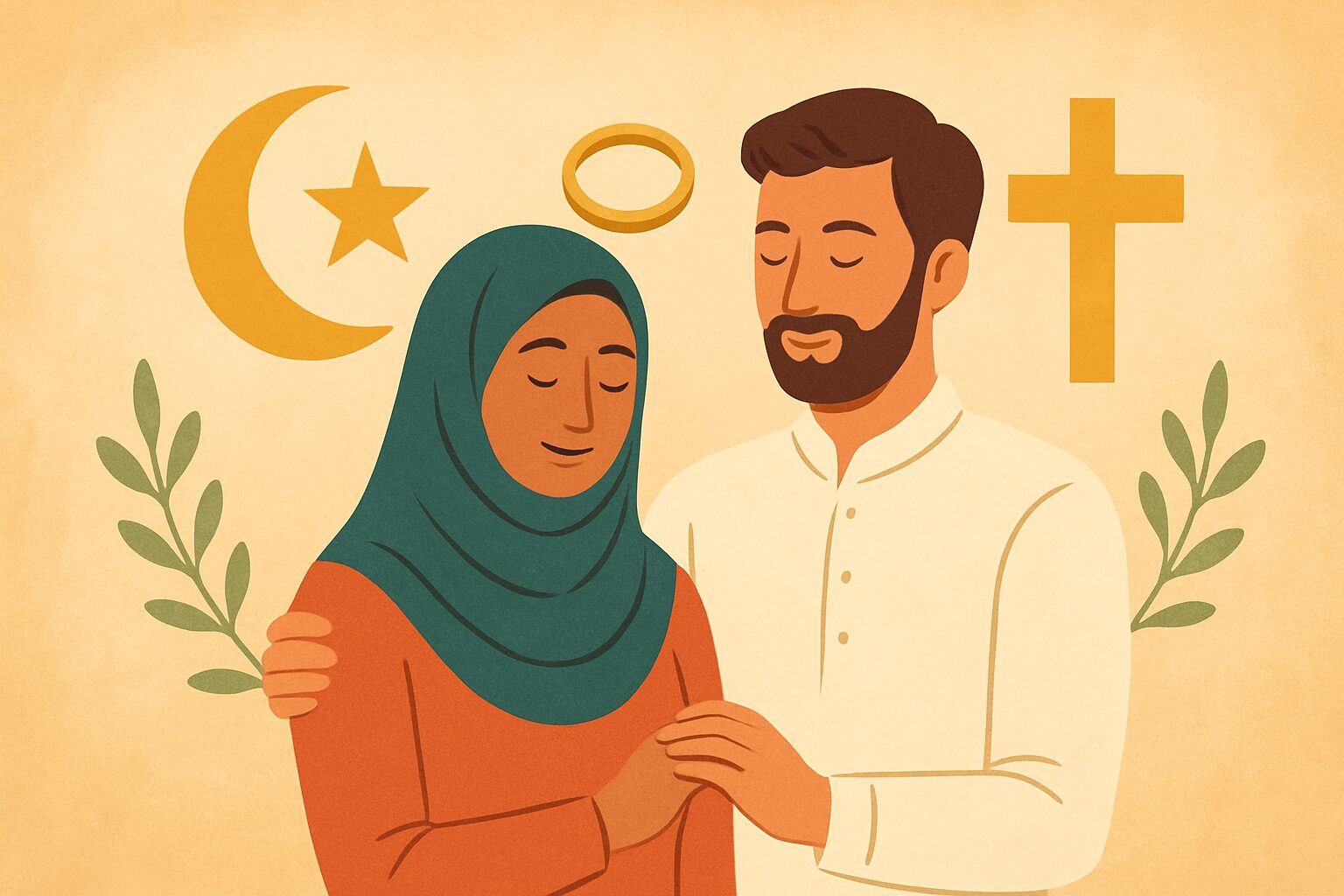Salaamun alaykum, dear readers!
Interfaith marriage is something that the Quran gives plenty of flexibility with. A Muslim man or woman can marry a Jew, atheist, Christian, Sikh, or any other non-polytheist.
The only prohibition is marrying someone who is a “mushrik” (polytheist) according to verse 2:221. An exception is given to a person that is a former polytheist and is now a believer.
[2:221] And do not marry the mushrikaat (polytheistic women) unless they believe; a believing slave woman is better than a mushrikah, even if she has pleased you. And do not marry the mushrikeen (polytheistic men) unless they believe; a believing slave man is better than a mushrik even if he has pleased you…
It actually turns out that trinitarian Christians are not categorized by God as “mushrikeen” (those who associate partners with God) even though in Islam they technically commit an act of “shirk” (which is the Arabic term for the act of partnering something or someone with God). That is because trinitarian Christians lack the conscious intent required to be labelled as one.
To give an example, a kid who accidentally hit someone with a bat cannot be labelled an assaulter or assailant because it was just an accident and he lacks the intent, even though the act of hitting someone with a bat itself is assault.
Another example is that if a man burns down his own house by accidentally starting a fire, he cannot be labelled as an arsonist even though he technically committed an act of arson (burning down property).
Likewise, Trinitarian Christians commit the technical act of “shirk” by believing that Jesus is God Himself. But they are not doing so with the intent of worshipping Jesus as a separate deity from God; they think they are worshipping God in human form, and think of themselves as monotheists. Hence, they lack the conscious intent to be labelled as a mushrikeen, and thus are allowed to be married.
Whereas polytheists (such as Hindus or followers of indigenous faiths) are aware that they are worshipping multiple gods, and they do so intentionally. Thus, when God uses the term “mushrikeen” (polytheist), it is referred to those only.
God indicates numerous times in the Quran that He judges acts by the intent, not by the act itself. One proof is that the Quran explicitly allows for marriage to Jews and Christians. If the Quran is allowing to marry a Christian, but doesn’t allow marriage to “mushrikeen”, then this means God in the Quran does not consider Christians to be a part of this category.
[5:5] Today, the good things have been made lawful for you. And the food of the ones who were given the Book is lawful for you, and your food is lawful for them, as well as the chaste women among the believers, and the chaste women among those who were given the Book before you…
[2:225] God does not hold you to account regarding what is vain in your oaths. But instead, He holds you to account regarding what your hearts have earned; God is Forgiving, Forbearing.
[2:264] O you who believed, you do not make vain your charities with gloating and hurt, like the one who spends his wealth to be seen by people, while he does not believe in God and the Last Day…
[9:8] How, as they back each other up against you, do they neither respect any relation concerning you, nor safety compact! They approve of you with their mouths while their hearts refuse, and most of them act in deviance.
[16:106] Whoever disbelieved in God after his faith, except for whoever was compelled while his heart remains content with faith. But instead, whoever expanded the chest with disbelief, then upon them is wrath from God, and for them is a great punishment.
Other than that, Muslim men and women aren’t forbidden to marry non-polytheistic non-Muslims (Buddhists, Sikh, Jew, atheist, and others).
What Does Verse 60:10 Mean?
Verse 60:10 is a purely situational verse that doesn’t apply to Muslims today.
This verse reads:
[60:10] O you who believed, when believing women have come to you as immigrants, then examine them. God is most knowledgeable of their faith. So if you have known them to be believers, then do not return them to the disbelievers. They (the disbelievers) are not lawful for them (believing women), nor are they (believing women) lawful for them (disbelievers). And give them what they spent; no blame is upon you if you marry them when you have given them their dowry. And do not retain marital ties to the disbelieving women…
As you can see, this verse applied only to the prophet’s time. This verse says “when believing women have come to you as immigrants”, which implies that this is about a time when the believers were all concentrated in one location, such that someone can “immigrate” to the believers.
Today, believers and non-Muslims are scattered everywhere across the globe rather than concentrated in one location, so one cannot really “immigrate” to the believers today.
The other indication is that this verse says to “test” or “examine” the believing women who used to be polytheists before letting them live with the believers. Obviously, this was only applicable to a time in the past when the Muslims were at war with the non-Muslims, and it was dangerous for security to let non-Muslims live amongst the Muslims.
- So this is the second indication that this verse is only addressing the believers during the time of the prophet, who were at war with the Meccan pagans, and is not addressing the believers today.
Therefore, verse 60:10 applied only to the prophet and the people who were with him at the time, when believers were all in one place (in Medina).
That means the prohibition against marriage to disbelievers in 60:10 only applied only to the people during the time of the prophet, and the disbelievers during the prophet’s time mainly consisted of polytheistic Arabs who were unlawful to marry as per verse 2:221.
What Does Verse 4:25 Mean?
Verse 4:25 states that those who cannot afford to marry free believing women may choose to marry a believing slave woman that they own.
So it is not mandating to marry believing women or forbidding to marry non-Muslim women, but it gives a second option for those who want to marry believing women but feel as if they cannot afford it.
- [4:25] So whoever is not able in affluence among you to marry the chaste believing women, then from what your right hands have possessed of your believing slave women…
It’s like saying, “Whoever can’t afford a college education may try trade school.” Obviously, this statement is not mandating that people go to college, but it is only providing a second option for those who want to go to college, but cannot afford it.
Conclusion
Interfaith marriages between Muslim men or women with non-Muslim men or women are permissible because no verse (which applies to present-day Muslims) prohibits it.
The only criterion is that the marriage cannot be to someone who is polytheistic (verse 2:221).
So do not feel guilty about your interfaith marriage, and do not let others make you feel like you are guilty or not a good Muslim for choosing to marry a non-Muslim.
The only concern about interfaith marriage is that if a non-Muslim man marries a Muslim woman, he has to agree to give her a dowry in accordance with the commands of the Quran as shown in the article in this link, otherwise her marriage to him wouldn’t be valid.
And before a divorce, a non-Muslim spouse should agree to go through arbitration involving a representative chosen from both sides (as per verse 4:35) to try to reconcile the marriage since that is mandated on Muslims before divorce. This is a precondition to divorce that should be included in a marriage contract if one or more spouse is a Muslim.
There is always a concern about which faith to raise a child born from an interfaith marriage upon, and the answer is that it is the job of the Muslim parent to promote Islam to the child (by involving the child in Islamic activities of daily life such as Salat, going to the mosque, reading the Quran with him or her, etc.) The Quran forbids compulsion in the religion (2:256) so the parent should never compel the child to do any religious activity.
At the same time, the non-Muslim spouse shouldn’t be prevented from promoting their faith to the child as well, because the Quran forbids double-standards.
At the end of the day, it is the job of the child to choose which path he or she will follow when the child grows up. This is true whether both parents are Muslim or non-Muslim.


Leave a Reply